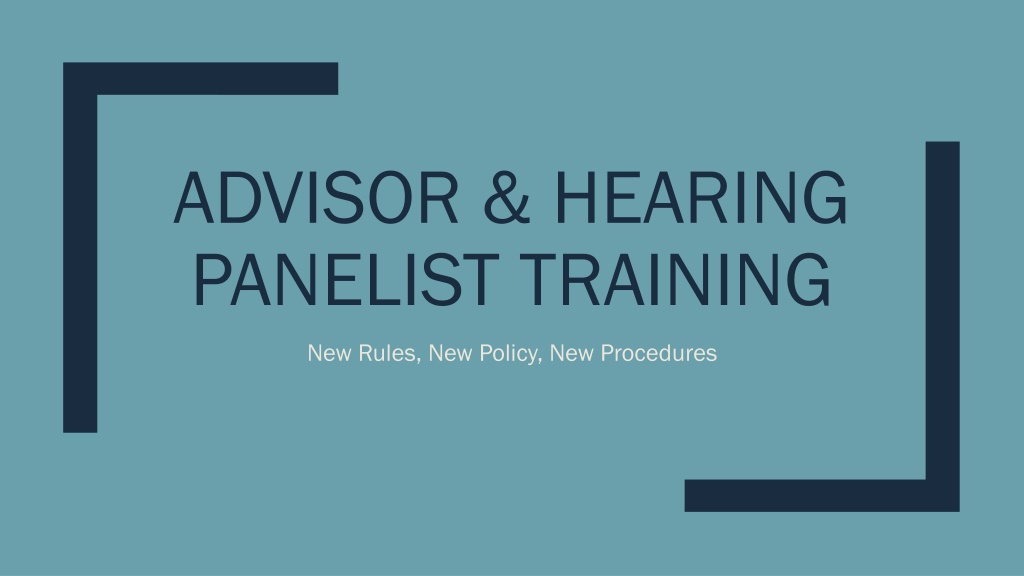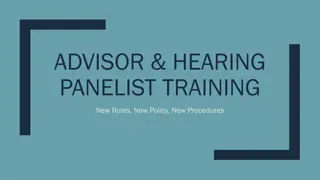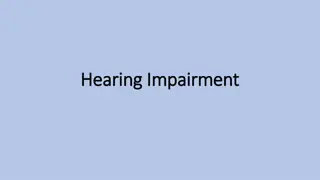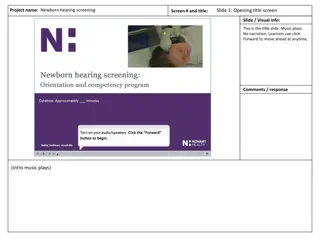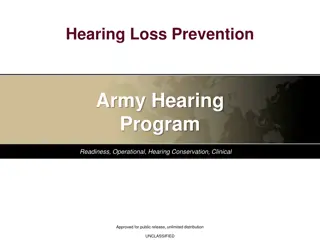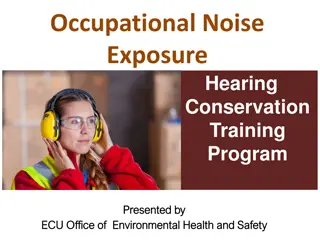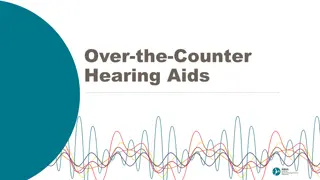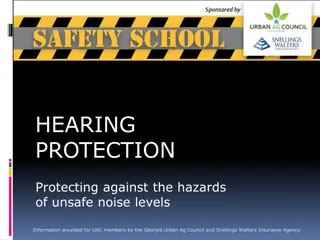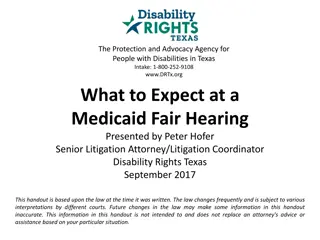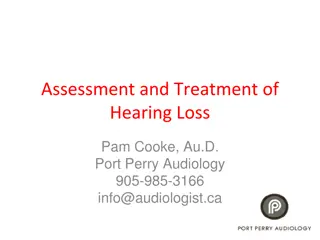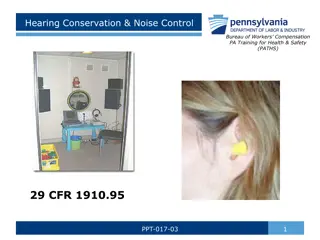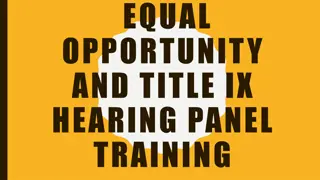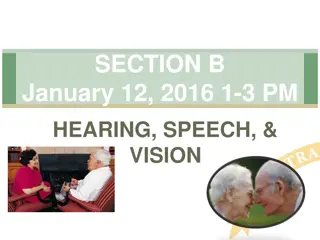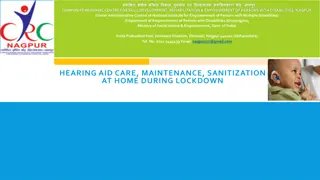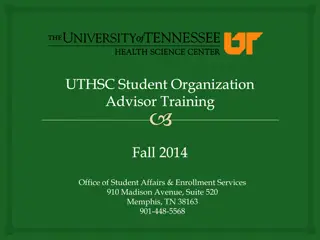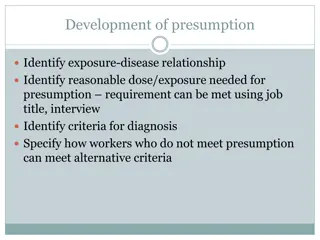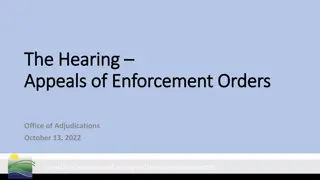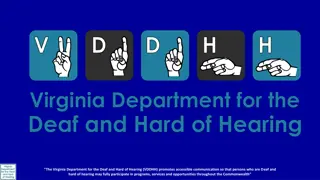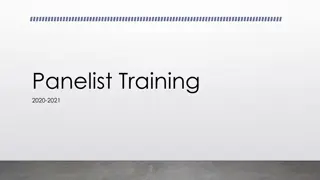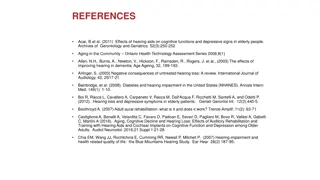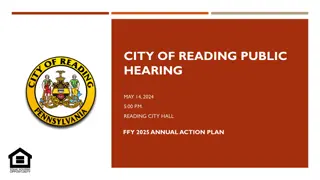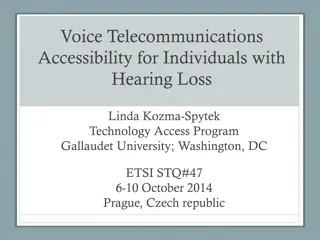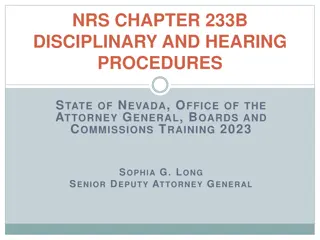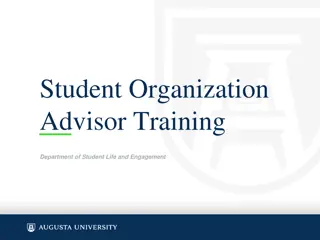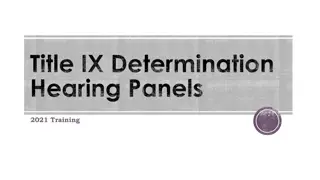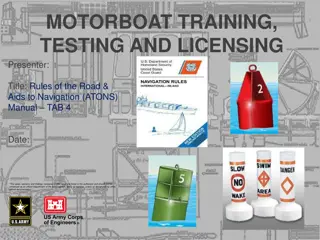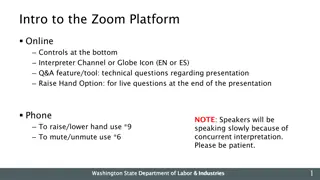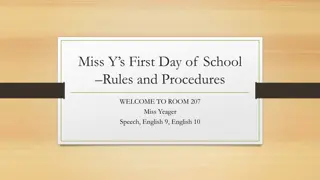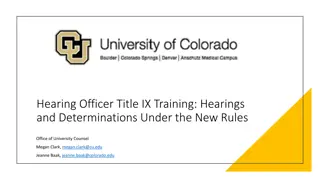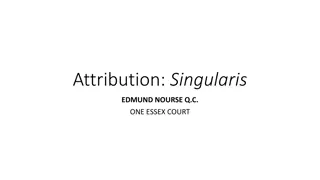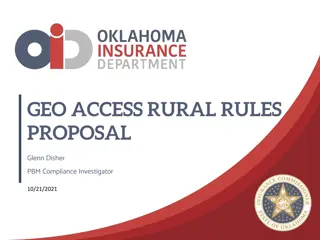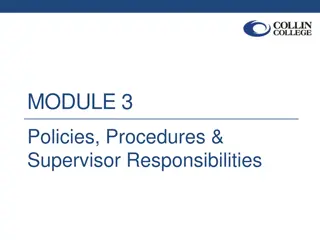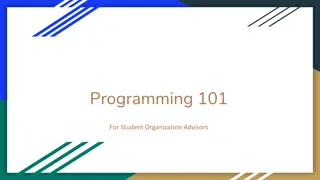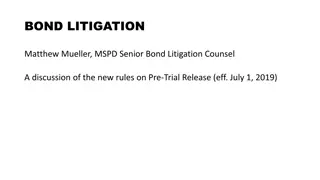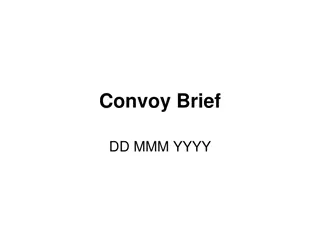New Rules and Procedures for Advisor and Hearing Panelist Training
Comprehensive training materials introducing new rules, policies, and procedures for advisor and hearing panelist roles in conducting live hearings for sexual harassment, assault, misconduct, violence, stalking, and retaliation cases. The content covers the scope of SIU's policy, when the policy applies, key individuals involved, important definitions, and details of educational programs and sanctions.
Download Presentation

Please find below an Image/Link to download the presentation.
The content on the website is provided AS IS for your information and personal use only. It may not be sold, licensed, or shared on other websites without obtaining consent from the author. Download presentation by click this link. If you encounter any issues during the download, it is possible that the publisher has removed the file from their server.
E N D
Presentation Transcript
ADVISOR & HEARING PANELIST TRAINING New Rules, New Policy, New Procedures
Scope of SIUs Policy and Procedure Interim Policy New Federal Law Requires LIVE hearings Sexual Harassment, Sexual Assault, Sexual Misconduct, Domestic Violence, Dating Violence, Stalking, and Retaliation ONLY But you can be an advisor for any case if asked and you want to be OEC will ask for hearing officers, you can decline if you want Applies to EVERYONE Student Conduct Code Old policy and procedures for EVERYTHING else Presumption of NON-Responsibility
When Does Policy Apply Formal Complaint Process A and B Process A Educational Program/Activity: SIU has control over both Respondent and Context of Conduct In US Process B Extended Jurisdiction: Control of Respondent Deprive C of access Substantial University Interest
Who is Involved Complainant Respondent Investigator Title IX Coordinator Hearing Chair Hearing Panel Advisor Confidential Advisor* Appeals Officer TAT
Definitions Advisor Person chosen by a party or appointed by SIU to accompany party to meetings related to resolution process, to advise party, and conduct cross examination at hearing Complainant Person who is the actual victim Respondent Person who is accused
Definitions Dating Violence Violence, on the basis of sex, committed by a person who has been in a romantic or intimate relationship with complainant Domestic Violence Violence, on the basis of sex Current/Former Spouse or Partner Share a child Cohabitated with as a spouse or partner Anyone protected under Illinois law NOT ROOMMATES (Anymore) Will change a little bit in October per VAWA
Definitions Educational Program or activity SIU has control over respondent and context of the conduct Finding Decision of the Panel Panel: Hearing Officers, One Chair and two others Sanction Punishment given by Panel Stalking Course of conduct, 2 or more independent actions threatens, endangers health, safety, emotional welfare, academics, employment
Definitions Consent Voluntary, Knowing, Not Incapacitated Incapacitated in not intoxicated For Hearing Panel: Be consistent in definition, Be impartial and look at the facts, know the policy Formal Grievance Process Signed Compliant, Investigation, Hearing Preponderance of the Evidence More Likely True than Not True
Consent Consent means a clear, affirmative, unambiguous and freely given agreement to engage in a specific sexual activity. Consent is demonstrated verbally or through actions that clearly indicate a willingness to engage in the specific sexual activity. Lack of verbal or physical resistance does not constitute consent. Consent to engage in sexual activity with one person does not constitute consent to engage in sexual activity with another person, and consent for a specific activity does not imply consent for any other activity. Use of alcohol, drugs, or other intoxicants does not diminish one s responsibility to obtain consent. Consent must be knowing and voluntary. To give consent, a person must be awake, of legal age, and have the capacity to reasonably understand the nature of his/her actions. Consent cannot be given by an individual who is mentally or physically incapacitated through the effect of drugs, alcohol or other intoxicants or for any other reason. Consent cannot be given when it is coerced, forced, or obtained by use of duress, fear, threats, or violence. Consent is not implied by the existence of a prior or current relationship or participation in prior sexual activity. A person s manner of dress does not constitute consent. Consent to engage in sexual activity may be withdrawn at any time and is automatically withdrawn by a person who is no longer capable of giving consent.
Definitions Supportive Measures* Remedies Supportive Measures ordered by Panel Retaliation Any act of reprisal, related to reporting, participating in, or NOT participating in a complaint of a violation on the policy policy Sexual Assault (includes attempts) Forced, Non-Consensual Rape (penetration, no matter how slight vagina, anus with any body part or object, or oral penetration of a sex organ) Sodomy (oral or anal intercourse ) Sexual Assault with an Object Fondling (touching of PRIVATE body parts buttocks, groin, breasts for sexual gratification) Also non-forced Incest or statutory rape
Definitions Sexual Harassment Educational (Process A and B for Students and Process A for Staff) Educational (Process A and B for Students and Process A for Staff) Quid Pro Quo Severe, Pervasive, AND Objectively Offensive Denies equal educational access Employment (Process A and B for staff) Employment (Process A and B for staff) Based on Title VII Quid Pro Quo Hostile Environment Sexual Misconduct Act of a sexual Nature that disrupts or negatively impacts the educational mission
SPOO: If its SPOO Discriminatory Effect is a given Severe Verbal (lower level) Touching, Force, Privacy Invasion, Violence/Threat of, Age, Explicit, Power Difference Pervasive Conduct or Effects of Conduct Totality, Facts specific, Frequency, Can C remove self, Damage, Openly practices, Denies access, Persistent, Changes terms/conditions AND Objectively Offensive Unwelcome, Reasonable Person, Similarly Situated, Community Standard, Don t be too narrow
Definitions OWA VC of SA, DoS, Director SRR, Director HR, Director of Athletics, Confidential Advisors Title IX Coordinator Director of OEC Oversees TIX policies and procedures
Incapacitation What does it look like Slurred speech Falling Blacking out Throwing Up Trouble walking Weird Behavior Both parties Did R give C alcohol
3 Questions Force Incapacitation Known or reasonably should have known Can victim make decisions based on their mental/physical state Blackouts Clear words or actions = Consent Silence = Not Consent, unless actions prove otherwise Can be withdrawn For every act At the time of the act Could include threats, coercion
Confidential Advisor Rose Robinson-Berkman Amanda Heslinga OEC SoM Required under state law For students only Staff must be offered supportive measures too Usually through OEC Professional Trained to provide support to survivors of sexual misconduct and GBV Duties Inform victim of reporting options Inform victim of OPs and NCOs Confidential Support Secure supportive measures Assist in making reports Medical Advocacy
Types of Supportive Measures Cannot Be Disciplinary or Punitive Housing Work Academic Dining Referrals Safety Planning Setting up appointments with other offices
Identifying a Person in Need Alienated Mental Health Concerns New or Sudden Changes in Behavior New of Sudden Difficulties in School/Work New health problems What to do? Saluki Cares Report SAFE Report?
Resources Know your resources Other Confidential Resources Health Services and CAPS (Do not report anything to OEC) Survivor Empowerment Center Ops Other Victim Advocates at Police Departments
Things to Know CA will reach out to student to offer Assistance (as will OEC) They are Confidential (but now have to report Supportive Measures to TIXC) No costs associated with the CA office Victims can change their minds Schedule an appointment 453-4429 Walk-Ins Saluki Health Protal
Mandated Reporters You are still a mandated reporter You do not need to report if you are asked to be an advisor, as it will have been already reported What if, as an advisor, you are given information that may not be known to others? May have to drop out, if you know they are going to lie You do NOT have priviledge safe.siu.edu No mandate to make a complaint Mandate is to make REPORT
Criminal, Civil, University Proceedings Criminal: Law Enforcement is Involved Civil: Law Suit University: Procedures OEC works with LE to gather information. They provide information to us. We don t provide information to them They have more avenues to find information Search warrants
DPS (Local Law Enforcement) Ben Newman Criminal Arrest if Probable Cause to do so If not, it goes to State s Attorney Explains process to Victim Report = Criminal Complaint Unless Informational State s Attorney has ultimate decision making powers May decide to charge, dismiss charge, change charge Criminal Complaint not needed for University Complaint DPS will interview, collect evidence, write report Fingerprints, biological, video, phone, etc.
DPS, OEC, Other Agencies Work together Depends on jurisdiction and what the victim wants Jurisdiction depends on where something happened Copies of reports Sharing information
Reporting to DPS 453-3771 911 Trueblood Hall Basement
Jurisdiction of OEC Program or Activity In US Accepted Jurisdiction Any building owned or controlled by student org On-line or in person No time limits But Can we do anything? Graduated, left SIU, No witnesses still available, etc. Only applies to something that took place AFTER August 14, 2020. Only policy applies (120 days) if the incident took place before that New Regs are NOT retroactive
Rights under Regs Right to present witnesses/be heard Right to Due Process/mount defense Right to know evidence for/against Gather and present evidence/witnesses Have an advisor Written notice Inspect and review evidence and final report Right to include directly related evidence to hearing, even if investigator left out of report Ask, through and advisor, relevant questions at hearing
Due Process Legal protections ensuring that no one will be deprived of education or employment without fairness in process Substantive Due process in decision Impartiality, fair, decision based on fact, etc. Procedural Due process in process Notice, consistency, allegations provided, etc.
Process All this will be done ~90 days Allegations Is it Title IX? PR, SAFE report, Email, Walk-In Emergency Removal = Title IX and TAT= Appealable Confidential Advisor Will Reach out OEC Will Reach out VAWA Brochure or P/P Amnesty Advisor CA Supportive Measures OEC CA
Process TAT If needed TIXC wants to file a complaint Only if C doesn t want to file a complaint Health or Safety Assessment Jurisdiction Violation Formal Complaint After interview (Complainant does not have to speak to us or make a formal complaint) OEC writes complaint Get info and witnesses Signed by C R are presumed NOT Responsible Until after the panel decides Complaints are presumed to have been made in good faith False Reports
Process Investigation (30 business days) Formal complaint Informal Resolution At any time in process Both parties must agree (voluntary and written) Will not go through the formal complaint process if IR is agreed upon by parties and TIXC R may accept responsibility If agreement is made, no appeal
Process-Notice of Complaint Notice of complaint Notice that parties may have advisors Summary of allegations ID of parties Policies implicated Description of possible sanctions Retaliation policy Names of Investigators Etc.
Process-Investigation Continued Dismissal Mandatory Not a violation of policy even if everything is true Conduct did not occur in educational program or activity or there is no control over respondent Process B? Not in US Discretionary C withdraws complaint R is no longer enrolled or employed (can t come back to SIU) If only a leave of absence, case will proceed Circumstances exist that prevent SIU from gathering evidence or going forward
Process-Investigation Continued Counterclaims Thorough, impartial investigation All interviews recorded Meet with Respondent They do not have to meet with OEC Info and Witnesses Meet with Witnesses We can t force witnesses to come speak with us or come to a hearing Although Gather Evidence Documentation? Video? Prompt Write statements and send to parties and witnesses
Process Continued Investigative Report (30 days) Gather, assess, and synthesize Comment Period (10 days) Share report with parties electronically, comment Finish report and send to TIXC, then to parties (no time limit) Hearing set (10 days) Information given Can request a different time, at least 5 days prior Pre-Hearing (Maybe) Determine relevance Hearing Finding (7 days) Sanctions/Remedies Appeal
Advisor Rights Advisor must be eligible and available May have to adjust schedule We can give a little leeway, just let us know You do not HAVE to be an Advisor Conflicts of Interest Do not have to be a lawyer and aren t acting as one when you are an advisor
Advisor Rules Party can have Advisor for all parts of FGP They may change Advisors Must provide notice of change Must have for Hearing If they come without one, we will appoint Advisor of Choice (see above) Pool Interviews Help prepare Potted Plant Rule Hearing Confidentiality
Advisors Must have for Hearing One will be appointed if party doesn t have one Cross Other roles may be limited Must follow guidelines Relevant Professional If they won t ask questions, we have to find someone who will They can choose anyone Attorney, mother, etc. Panel is authority over the Advisor, make them play by the rules
Sharing information with Advisor OEC must have a written release Privacy Expected to keep information private Cannot share the records
Intake Your name will be provided to the parties They may contact you You can discuss whether or not you are available They may need you to help assist them find another Advisor if you are not available They may also need other assistance Confidential Advisor Survivor Empowerment Center Counseling Attorney for Criminal Case Etc.
Trauma Informed Intake Dr. Abby Bilderback When using a trauma informed approach, it is imperative to understand what trauma is and how trauma affects individuals responses to services and the interview process. Policies and procedures should be developed with the goal of avoiding victim re- traumatization, increasing the safety of all, and increasing the effectiveness and efficiency of interactions with victims. A trauma-informed approach begins with understanding the physical, social, and emotional impact of trauma. This includes victim-centered practices. It incorporates the following elements which are the goals for today s training: Increase understanding of the neurobiology of trauma Increase knowledge of trauma informed interview strategies Learn specific strategies to utilize when interviewing trauma survivors
A trauma-informed interview generally contains the following strategies: Demonstrating genuine empathy and a nonjudgmental stance. Establish an initial level or trust. Ensuring a safe and comfortable environment (emotionally and physically); is the interview space welcoming, inviting, and comfortable? Are there clear exits? Encouraging and allowing victims to ask questions. Allowing some time and space for the victim to process the experience. Providing the victim as much control over and during the interview as possible. Focusing on sensory memories. Explaining why a difficult question is being asked.
Things to avoid in a trauma-informed interview: Asking why questions that can be perceived as blaming. Requests for a chronological account (remember the order in which the brain encodes memories may be significantly impacted by stress hormones making this question very difficult for a trauma survivor to answer). Reacting with disbelief. Minimizing what happened. Reacting with blame, criticism, or judgement.
Hearing Panel Role Uphold Process Chair Panelists Maintain standards Be impartial Ask Questions Follow guidelines set by policy and procedure Don t have to agree with policy, but must uphold the policy
Hearing Pre-Hearing meeting (Chair) Relevancy Questions Either side can request Both sides have should be allowed to be at the meeting Stiputations? Hearing Cross-Examine If you refuse, you ll be removed (Advisor) No direct questioning by the parties Hearing Chair decides the relevance of questions Advise Don t be disruptive or you ll be removed May be up against an attorney
Hearings Panel Chair will decide relevance and procedure Panel will ask questions All questions asked at hearing must be relevant What is relevant Questions about the event (who, what, when, where) Corroboration Gaps in report Be kind, patient, neutral, flexible, and ask open ended questions (Short questions people have short attention spans) Past disciplinary history of R (only at sanctioning stage) Written Impact Statement-only after a finding is made What is NOT relevant Incidents not directly related to the case at hand, unless to show a pattern Character of the parties C sexual predisposition or prior sexual behavior, unless Used to prove the someone other than R did the action Or based on prior activity with the R and used to prove Consent
Hearings Investigators will be witnesses TIXC not involved but must be at hearing Parties and Witnesses DO NOT have to come to hearing, NOW, but that may effect credibility There will be a script Live, but not necessarily in person Recorded
What you as a hearing officer/advisor should do before the hearing Read Complaint Read Policy Read Report More than once? Make sure you look at appendix! Make notes to ask questions Note who you should ask what Note what you want to know and why (Is it relevant?)
Cross-Examination Relevance of questions are determined by Chair of Panel Ask Advisor why it s relevant May go to credibility If the question has already been asked (by panel) and answered, Chair can ask why they are being asked again and can deny it) Chair must explain their decision Irrelevant, unduly repetitious, or abusive MUST have Advisors for this Advisors can be reprimanded or removed from hearing is they don t follow the rules
